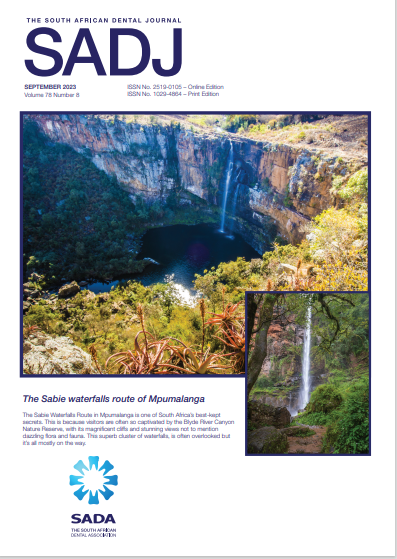Inaccessible specialised oral health services in South Africa – rationing policy uncertainty
Inaccessible specialised oral health services in South Africa – rationing policy uncertainty
Keywords:
restrictions, indefiniteAbstract
Rationing by waiting lists is associated with patient costs such as pain, anxiety and poor health outcomes. Rationing is indicative of a mismatch between the demands and resources to service patients’ needs. Long waiting times for specialised oral health services are concerning and unjustifiable. The majority of oral health care services are devoid of an explicit policy and mechanism to address this
problem. This paper attempts to provide the ethical basis for waiting times. That is, whether the mechanisms used in the allocation of services (or placing patients on waiting lists) is consistent with ethical principles.
Downloads
References
Moosa MR, Luyckx VA. The realities of rationing in health care. Nature Reviews Nephrology.2021; 17(7): 435-6
Tauber AI. Medicine, public health, and the ethics of rationing. Perspectives in Biology and Medicine.2002; 45(1):16-30. https://doi.org/10.1353/pbm.2002.0018
Human A. A Comparison of Health Care Systems: South Africa vs. Canada. UBC Medical Journal.2010; 2(1): 33
Rice MF, Jones W Jr. The uninsured and patient dumping: recent policy responses in indigent care. J Natl Med Assoc. 1991;83(10):874-80
McQuoid-Mason DJ. ‘Over-servicing’, ‘underservicing’ and ‘abandonment’: What is the law? South African Medical Journal.2015; 105(3):181-182
Moosa S, Carmichael T, Luiz J, Peersman W et al. Insights of private general practitioners in group practice on the introduction of National Health Insurance in South Africa. African Journal of Primary Health Care and Family Medicine.2016; 8(1): 1-6
Daniels, Norman. “Rights to health care and distributive justice: programmatic worries.” Health Rights. 2017: 23-40
Alexander LA. Fair equality of opportunity: John Rawls’(best) forgotten principle. Philosophy Research Archives.1985; 11:197-208
Lanoix M. From normal species functioning to capabilities, is it enough? The American Journal of Bioethics. 2013; 13(8): 20-1. https://doi.org/10.1080/15265161.2013.804337
John TM, Millum J. First come, fi rst served? Ethics.2020; 130(2):179-207
Veatch RM. Healthcare rationing through global budgeting: the ethical choices. The Journal of Clinical Ethics.1994; 5(4):291-6
Persad G, Wertheimer A, Emanuel EJ. (2009). Principles for allocation of scarce medical interventions. The Lancet.2009;373(9661):423-31. https://doi.org/10.1016/S0140-6736(09)60137-9
Bentham J. (1830). The greatest happiness of the greatest number. Bentham’s political thought.1830: 309-310
Veenhoven R. Greater happiness for a greater number: Is that possible? If so, how. Designing Positive Psychology. 2011: 396-409
Mill JS. Utilitarianism. In Seven Masterpieces of Philosophy.2016: 329-375
Farrant A. The fair innings argument and increasing life spans. Journal of Medical Ethics.2009; 35(1):53-56.http://dx.doi.org/ 10.1136/jme.2007.023762
Bognar G. Fair innings. Bioethics.2015; 29(4):251-261. https://doi.org/10.1111/bioe.12101
Harsanyi JC. Can the maximin principle serve as a basis for morality? A critique of John Rawls’s theory. American Political Science Review. 1975;69(2):594-606. https://doi.org/10.2307/1959090
Savulescu J, Cameron J, Wilkinson D. Equality or utility? Ethics and law of rationing ventilators. British Journal of Anaesthesia.2020;125(1):10-5. https://doi.org/10.1016/j.bja.2020.04.011
Ashcroft RE. Quality of life as the basis of health care resource allocation: a philosopher’s perspective on QALYs. AMA Journal of Ethics.2005; 7(2):195-9
Wong DA. Rationing treatments based on their cost per QALY. AMA Journal of Ethics.2011;13(3):220-3
Downloads
Published
Issue
Section
License

This work is licensed under a Creative Commons Attribution-NonCommercial 4.0 International License.





.png)